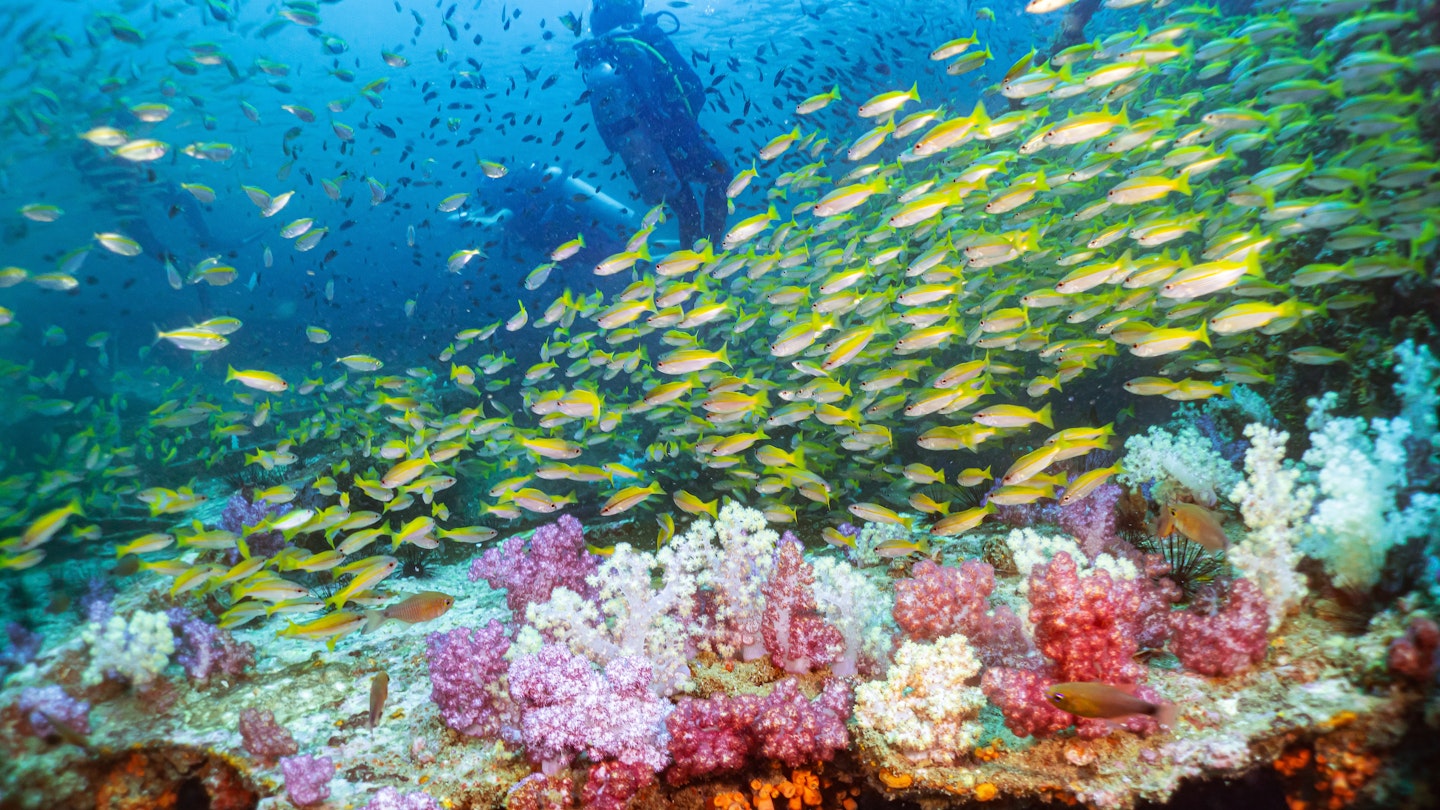Coral reefs are intricate ecosystems that breathe life into the world’s oceans — but they are under threat.
Destruction of reefs — such as mass coral bleaching — results from a combination of factors including climate change and pollution. Scientists and communities are dedicated to protecting these marine environments, and in some destinations, travelers can help too by participating in coral regeneration schemes.
What are coral regeneration schemes?
Coral regeneration schemes restore damaged and endangered reef ecosystems, such as the Baa Atoll in the Maldives. Scientists collect coral fragments from local reefs to be raised in nurseries until maturity, and later plant or restore them at reef sites. After decades of collaborative work by scientific and community-based coalitions around the globe, these schemes have proven effective for restoring thriving reef systems.
How does this help the sustainability of the oceans?
Coral reefs are lush underwater ecosystems, thought to be the home of around 25% of all marine life. These ecosystems provide homes, stability, and sustainability to many marine flora and fauna species. Furthermore, they protect coastal shorelines from storms and surges and assist with water filtration in the oceans. Consequently, they are essential to the health of our planet. Coral restoration efforts aim to protect these environments and nurse them back to health.

How to join coral restoration efforts around the world
Caring for coral reefs begins at an individual level; knowing how to be a responsible diver is key. However, there are organizations worldwide that accept volunteers, allowing individuals to learn from marine biologists, conservationists, and divers. With the correct support, you can get directly involved with coral regeneration schemes. Therefore, conducting research ahead of time to assess the suitability of a scheme is essential.
Maldives
Located in the Indian Ocean, the Maldives heavily depend on coral reefs for food provision, shoreline protection, and one of the largest economic sectors for the islands: tourism. This tropical destination provides endless opportunities for visitors to engage with the Baa Atoll, from snorkeling with whale sharks and manta rays to assisting marine biologists focused on restoring local coastal coral reef nurseries.
Many techniques are employed on the islands to build various areas of the reef or create new ones entirely. Consequently, researchers in the Maldives are witnessing their corals regenerate after destructive coral bleaching just a few years ago. Joining trained divers can lead to firsthand participation in collecting coral or constructing structures for regenerative nurseries. These initiatives are designed to rebuild and regrow damaged coral reefs off the island’s coasts, consciously connecting travelers with the marine environment.

Key Largo, Florida
Widely known as the “father of coral restoration”, Ken Nedimyer founded the largest coral reef restoration organization, which has outplanted thousands of corals on the Florida Reef Tract throughout the Florida Keys and welcomes volunteer divers to assist with numerous tasks year-round. From diving programs to citizen science and educational activities, there is something for every reef lover.
The Loggerhead Marinelife Center provides opportunities for visitors to gain firsthand experience with sea turtle protection and coral restoration programs. Additionally, the Mote Marine Laboratory offers a program for individuals seeking to help with coral reef restoration, monitoring, and research. Other organizations encourage divers to participate in reef fish surveys to support ongoing research efforts.
Caribbean
In the Caribbean, opportunities abound for hands-on involvement with coral reef regeneration. Foundations such as the Reef Renewal Foundation in Bonaire invite visitors and volunteer scuba divers to aid in restoring reefs like the Tortugas Reef in the Caribbean Sea.
Resorts like Round Hill Villas in Jamaica have initiated reef garden projects aimed at regenerating local coral communities. Committed to restoring these ecosystems, Round Hill and its guests work closely with marine scientists to replant corals and nurture the intricate coral reef systems in the area.

Fiji
Fiji is a destination rich with coral reef regeneration volunteer opportunities, showcasing an impressive 42% of the world’s coral species. Surrounded by the largest coral reef system in the Southwest Pacific, this region features four major reef systems, including Great Astrolabe Reef and Nuku Reef. The reef ecosystems here are crucial for the population, providing subsistence, coastal protection, and revenue from tourism.
Luxury resorts such as Jean-Michel Cousteau Resort offer eco-friendly accommodations and an on-site marine biologist to demonstrate coral planting techniques. Similarly, Outrigger Fiji Beach Resort features coral gardens for guests to tend to, alongside engaging family conservation programs suitable for all ages.
French Polynesia
Organizations like Coral Gardeners in French Polynesia provide opportunities for interested divers to directly participate in coral planting on the reefs of Mo’orea—allowing divers to adopt and name a coral of their choice. The Brando, an eco-resort, is also actively working to preserve coral ecosystems through various programs, inviting volunteers to assist with research on coral health.
Safety recommendations during a pandemic can change rapidly. It is crucial for travelers to check with local authorities for up-to-date guidance before traveling.





